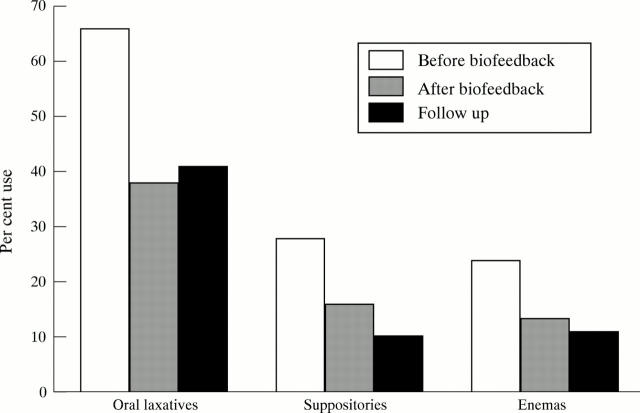Abstract
Background—Many patients with idiopathic constipation do not respond to conventional medical treatments. Recently biofeedback has been proposed as an alternative treatment but the long term results, and which patients benefit, are unknown. Treatment has usually been restricted to patients with normal colonic transit and impaired pelvic floor coordination on straining. Aims—To determine the efficacy and long term outcome of biofeedback treatment in idiopathic constipation. Methods—One hundred consecutive contactable patients who had completed a course of biofeedback more than 12 months previously were identified. Pretreatment details of bowel function and symptoms, whole gut transit time, and anorectal physiological testing, which had been previously prospectively collected, were collated. Follow up consisted of structured interview. Sixty five per cent had slow transit and 59% had paradoxical pelvic floor contraction on straining. Results—Median follow up was 23 months (range 12-44). On long term follow up 55% felt that biofeedback had helped and 57% felt their constipation was improved. There was a significant reduction in need to strain, abdominal pain, bloating, and oral laxative use. Spontaneous bowel frequency was significantly improved by treatment. Patients with slow and normal transit, males and females, and those with and without paradoxical contraction of the anal sphincter on straining, benefited equally from treatment. Anorectal testing did not predict outcome. Conclusion—This study suggests that biofeedback is an effective long term treatment for the majority of patients with idiopathic constipation unresponsive to traditional treatments. Pelvic floor abnormalities and transit time should not form selection criteria for treatment.
Keywords: constipation; biofeedback; follow up; laxatives; transit time
Full Text
The Full Text of this article is available as a PDF (112.2 KB).
Figure 1 .
Use of oral laxatives, enemas, and suppositories.
Selected References
These references are in PubMed. This may not be the complete list of references from this article.
- Bassotti G., Whitehead W. E. Biofeedback as a treatment approach to gastrointestinal tract disorders. Am J Gastroenterol. 1994 Feb;89(2):158–164. [PubMed] [Google Scholar]
- Bleijenberg G., Kuijpers H. C. Biofeedback treatment of constipation: a comparison of two methods. Am J Gastroenterol. 1994 Jul;89(7):1021–1026. [PubMed] [Google Scholar]
- Bleijenberg G., Kuijpers H. C. Treatment of the spastic pelvic floor syndrome with biofeedback. Dis Colon Rectum. 1987 Feb;30(2):108–111. doi: 10.1007/BF02554946. [DOI] [PubMed] [Google Scholar]
- Denis P., Dewe C., Dorival M. P., Helluin C., Lecouturier M. F., Malandain C., Mayeur S., Roussignol C., Saiter C., Touchais J. Y. Expérience des problèmes soulevés par le biofeedback au sein d'une équipe hospitalière. Gastroenterol Clin Biol. 1990;14(1):5–7. [PubMed] [Google Scholar]
- Enck P. Biofeedback training in disordered defecation. A critical review. Dig Dis Sci. 1993 Nov;38(11):1953–1960. doi: 10.1007/BF01297069. [DOI] [PubMed] [Google Scholar]
- Evans R. C., Kamm M. A., Hinton J. M., Lennard-Jones J. E. The normal range and a simple diagram for recording whole gut transit time. Int J Colorectal Dis. 1992 Feb;7(1):15–17. doi: 10.1007/BF01647654. [DOI] [PubMed] [Google Scholar]
- Farthing M. J., Lennard-jones J. E. Sensibility of the rectum to distension and the anorectal distension reflex in ulcerative colitis. Gut. 1978 Jan;19(1):64–69. doi: 10.1136/gut.19.1.64. [DOI] [PMC free article] [PubMed] [Google Scholar]
- Fleshman J. W., Dreznik Z., Meyer K., Fry R. D., Carney R., Kodner I. J. Outpatient protocol for biofeedback therapy of pelvic floor outlet obstruction. Dis Colon Rectum. 1992 Jan;35(1):1–7. doi: 10.1007/BF02053330. [DOI] [PubMed] [Google Scholar]
- Ho Y. H., Tan M., Goh H. S. Clinical and physiologic effects of biofeedback in outlet obstruction constipation. Dis Colon Rectum. 1996 May;39(5):520–524. doi: 10.1007/BF02058704. [DOI] [PubMed] [Google Scholar]
- Kamm M. A., Lennard-Jones J. E. Rectal mucosal electrosensory testing--evidence for a rectal sensory neuropathy in idiopathic constipation. Dis Colon Rectum. 1990 May;33(5):419–423. doi: 10.1007/BF02156270. [DOI] [PubMed] [Google Scholar]
- Kawimbe B. M., Papachrysostomou M., Binnie N. R., Clare N., Smith A. N. Outlet obstruction constipation (anismus) managed by biofeedback. Gut. 1991 Oct;32(10):1175–1179. doi: 10.1136/gut.32.10.1175. [DOI] [PMC free article] [PubMed] [Google Scholar]
- Koutsomanis D., Lennard-Jones J. E., Roy A. J., Kamm M. A. Controlled randomised trial of visual biofeedback versus muscle training without a visual display for intractable constipation. Gut. 1995 Jul;37(1):95–99. doi: 10.1136/gut.37.1.95. [DOI] [PMC free article] [PubMed] [Google Scholar]
- Kuijpers H. C., Bleijenberg G. The spastic pelvic floor syndrome. A cause of constipation. Dis Colon Rectum. 1985 Sep;28(9):669–672. doi: 10.1007/BF02553449. [DOI] [PubMed] [Google Scholar]
- Lestàr B., Penninckx F., Kerremans R. Biofeedback defaecation training for anismus. Int J Colorectal Dis. 1991 Nov;6(4):202–207. doi: 10.1007/BF00341391. [DOI] [PubMed] [Google Scholar]
- Papachrysostomou M., Smith A. N. Effects of biofeedback on obstructive defecation--reconditioning of the defecation reflex? Gut. 1994 Feb;35(2):252–256. doi: 10.1136/gut.35.2.252. [DOI] [PMC free article] [PubMed] [Google Scholar]
- Preston D. M., Lennard-Jones J. E. Anismus in chronic constipation. Dig Dis Sci. 1985 May;30(5):413–418. doi: 10.1007/BF01318172. [DOI] [PubMed] [Google Scholar]
- Read N. W., Timms J. M., Barfield L. J., Donnelly T. C., Bannister J. J. Impairment of defecation in young women with severe constipation. Gastroenterology. 1986 Jan;90(1):53–60. doi: 10.1016/0016-5085(86)90074-0. [DOI] [PubMed] [Google Scholar]
- Turnbull G. K., Ritvo P. G. Anal sphincter biofeedback relaxation treatment for women with intractable constipation symptoms. Dis Colon Rectum. 1992 Jun;35(6):530–536. doi: 10.1007/BF02050531. [DOI] [PubMed] [Google Scholar]
- Wexner S. D., Cheape J. D., Jorge J. M., Heymen S., Jagelman D. G. Prospective assessment of biofeedback for the treatment of paradoxical puborectalis contraction. Dis Colon Rectum. 1992 Feb;35(2):145–150. doi: 10.1007/BF02050669. [DOI] [PubMed] [Google Scholar]



